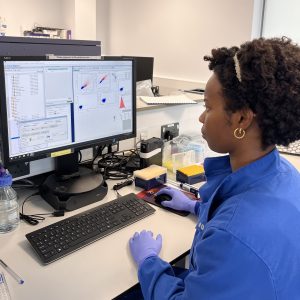Nubia Castillo Mosquera is one of the CentreŌĆÖs iPhD students. She is currently studying how we can improve immunotherapy treatments for children with Neuroblastoma. But this isnŌĆÖt her first role at the Centre.
Nubia joined the University of Southampton as a research technician in the CentreŌĆÖs Ward Ober laboratory, supporting research into Fc-mediated trafficking in macrophages and the engineering of antibody-drug conjugates in cancer therapy.
It was this work, as well as seeing family members fight experience cancer, hat led her to pursue a career in cancer immunology. Here, she tells is what her current research focuses on and her hopes for the future.
I lost my grandfather a few years ago after suffering from prostate cancer and I currently have family members and friends fighting against it. I am grateful for the options they have to overcome their diseases, and I hope the work I am doing, can somehow contribute to improving neuroblastoma therapy.
Please explain what your research focuses on?
My research focuses on enhancing Neuroblastoma therapy. Neuroblastoma is an aggressive childhood cancer with sadly, poor survival rates. Anti-GD2 immunotherapy has improved long-term survival but better therapeutic options are still desperately needed. My research focuses on investigating how monoclonal antibodies can be combined with chemotherapy to kill neuroblastoma cells and potentially boost immune responses. My project is supervised by Dr Juliet Gray, Professor Stephen Beers, and Dr Jane Willoughby and is funded by a PhD studentship from Wessex Medical Research and a studentship from the Cancer Immunology Talent Fund.
What impact could your research have on cancer patients?
Clinical trials provide a robust way to test new treatments. My research findings could provide future clinical trials with guidance on potential drug combinations and dosages, which could improve the prognosis of children with neuroblastoma.
What impact could your research have on the field of cancer immunology?
My research would provide further understanding of how anti-GD2 immunotherapy can be combined with chemotherapy drugs and possibly other agents to improve treatments for neuroblastoma. ┬Ā

Why did you decide to focus on that particular area of research?
I read about immunotherapy and how it can be used to treat many cancers that previously could not be treated. I was particularly impressed by its ability to help the immune system recognize and target cancer cells while sparing the healthy cells.
Where did you study/work before coming to the Centre for Cancer Immunology.
I graduated with a degree in Biomedical Science from Coventry University and when I graduated, I returned home, to Colombia, and worked as a research assistant at the University of the Andes. There, I supported research in the Mycology and Plant Pathology Laboratory led by Dr. Silvia Restrepo. Working there, I was able to put into practice a lot of the knowledge I acquired during my undergraduate studies, but I also realized that in order to progress academically, I needed to further my education. I applied and won a scholarship given by my department (Choco) and Colciencias, the Department of Science Technology and Innovation in Colombia, to undertake a Master of Science in Biomedical and Molecular Science Research degree at KingŌĆÖs College London. As part of my thesis, I investigated candidate driver genes in Sezary syndrome, an aggressive leukemic variant of Primary Cutaneous T Cell Lymphoma. This was my first experience working on translational research, which I really enjoyed. Speaking with patients made me connect to a deeper level to the work I was doing, which gave me purpose and cemented my interest in working on translational research.
Why did you decide to work at Southampton and in particular the Centre for Cancer Immunology?
After my studies in London, I joined the University of Southampton as a research technician where I supported research for two grants- Fc-mediated trafficking in macrophages and the engineering of antibody-drug conjugates in cancer therapy at the Ward Ober laboratory. I wanted to work at the Centre because it is the first center specifically dedicated to cancer immunology research in the UK. Being based here would allow me to learn from leaders in the field and work alongside very talented individuals. In addition, I am motivated to contribute to translational research, and the Centre benefits from worldwide collaborations and having a clinical trials unit on site makes it the perfect place to take basic science straight to the clinic. ┬Ā┬Ā
What excites you most about the future of your research field?
Although a lot of knowledge has been acquired over the past decades, there are still a lot of unknowns in the field of cancer immunotherapy. I am excited about the prospect of new breakthroughs that can help us understand how to use the immune system to eliminate more tumours and how immunotherapy can be boosted to help a wider range of patients. ┬Ā
┬Ā
I want to continue learning, developing myself further, and hopefully, one day be able to lead my own research and continue contributing to the field of cancer immunology.